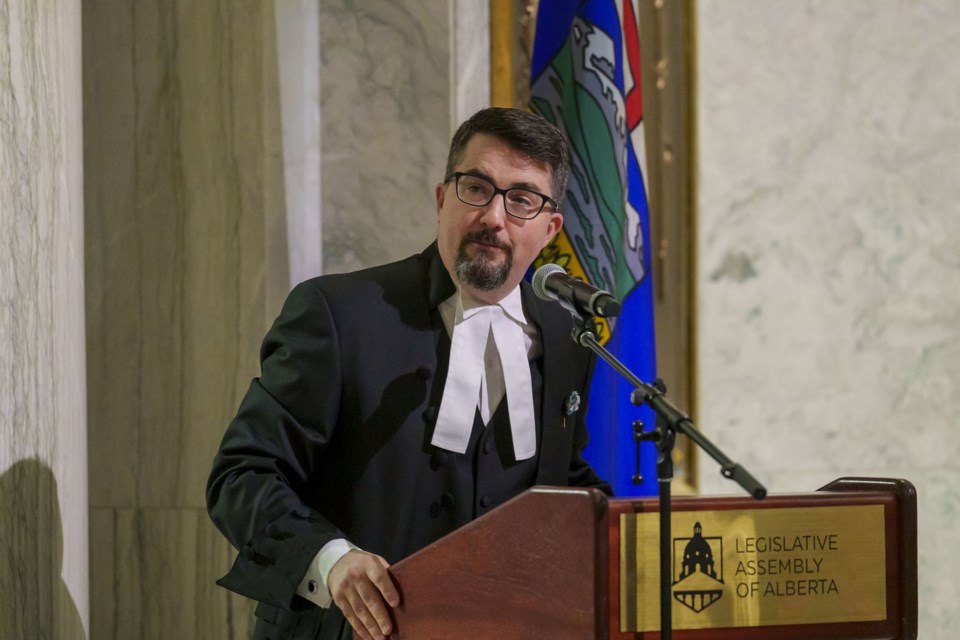Almost literally on his way out the door last week, the former speaker of the Alberta legislature — spoke.
But this time the words from Nathan Cooper’s mouth were those of a regular member of the assembly. For six years, he was the official keeper of decorum during the politically charged back-and-forth under the dome.
When Cooper spoke, everyone listened and everyone obeyed, for the most part politely accepting his rulings and interpretations based on centuries of parliamentary tradition.
His absence from the rank-and-file and his short-lived return did not go unmentioned.
“I’m proud to say that the honourable member was one of the first people to support me in my byelection in 2018. But it took him 2,499 days, or six years, 10 months and three days, to actually ask me a question in this house,” quipped Devin Dreeshen, the minister of transportation and economic corridors.
Dreeshen represents the central Alberta riding of Innisfail-Sylvan Lake, right next to Cooper’s riding of Olds-Disbury-Three Hills.
First elected by the assembly as speaker in May 2019, Cooper held the role until announcing just before the end of this spring’s sitting that he was stepping down. Cooper is also resigning as the member elected by voters in his riding, having accepted a government appointment as Alberta’s representative in Washington, DC.
But before packing his bags, Cooper tossed softballs to members of cabinet, talked up his riding and praised the UCP government for its spending in rural Alberta.
He said: “In the outstanding constituency of Olds-Didsbury-Three Hills, every spring farmers invest in seeds and fertilizer to make the crops grow, just like our government invests in infrastructure and the future of our province to make this province grow. With new schools and innovative projects, we reap the benefits of that growth.”
Rajan Sawhney, then the minister of advanced education, took the cue to mention $63 million over three years for the expansion of the W.J. Elliot Building at Olds College. The expansion creates 440 apprenticeship seats and 100 new dual credit seats.
Since 2019 the government has provided the college with operating grants worth $200 million and capital maintenance and renewal funding worth $27 million, added Sawhney, the member for Calgary-North West.
“I want to thank the member for his incredible advocacy on behalf of his constituents,” said Sawhney, who on Friday was sworn in as Indigenous affairs minister in a limited cabinet shuffle.
For Acme, a village that’s also in Cooper’s riding, the former speaker touted the building of a rural centre of training excellence in conjunction with a new high school. He asked the education minister to explain why training at home is “keeping rural Alberta vibrant.”
Demetrios Nicolaides responded that investing in rural Alberta is a long-time government priority. Training helps communities “grow talent at home” to contribute to the local community and economy, said Nicolaides, the member for Calgary-Bow.
For his part, Dreeshen singled out $3.5 million budgeted for a water project in Mountain View county. Cooper had asked him to detail his “favourite investments” in rural Alberta — to interjections from the floor.
“Order, order, order,” said the speaker. As in Ric McIver, the new speaker and the former minister of municipal affairs.
McIver was elected speaker by a vote of the assembly May 13. He’s a fourth-term MLA for Calgary-Hays.
Cooper first entered provincial politics in the 2015 general election, representing the Wildrose party.
On his last day as speaker, May 7, Cooper said: “Serving this assembly has been one of the greatest honours of my lifetime. Standing alongside each of you and serving you has been a dream that I’ve lived out each day.
“But today that dream comes to an end, as my time in the chair will only last a few more minutes.”



